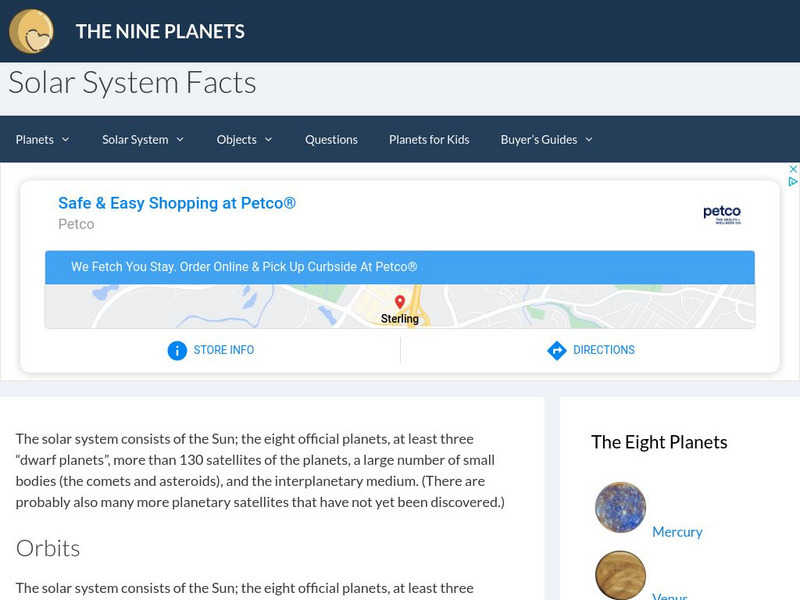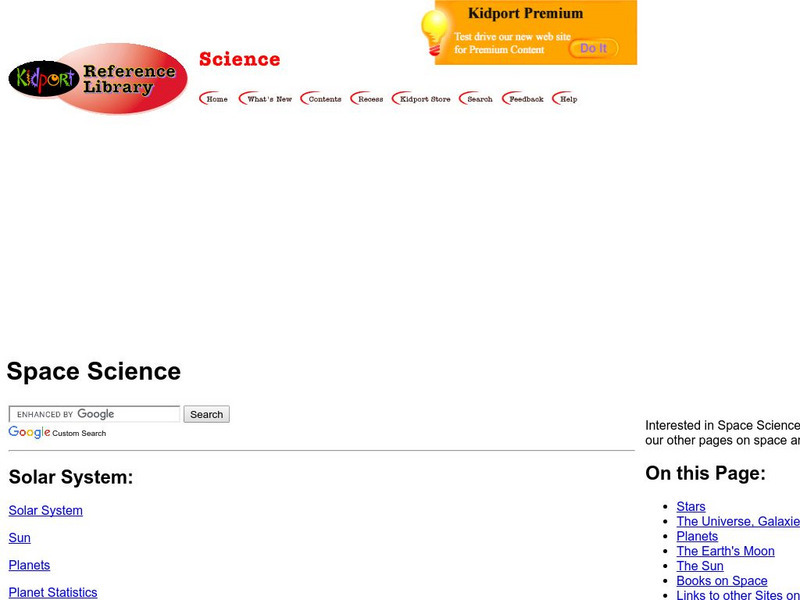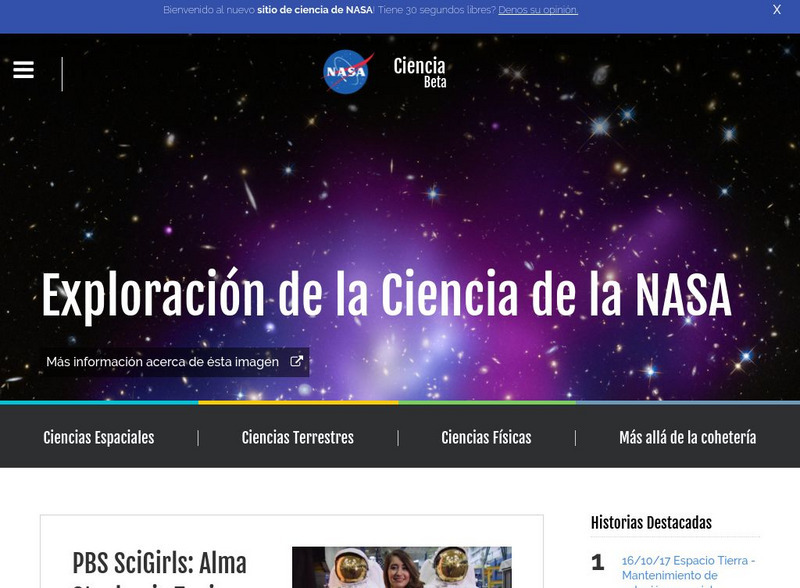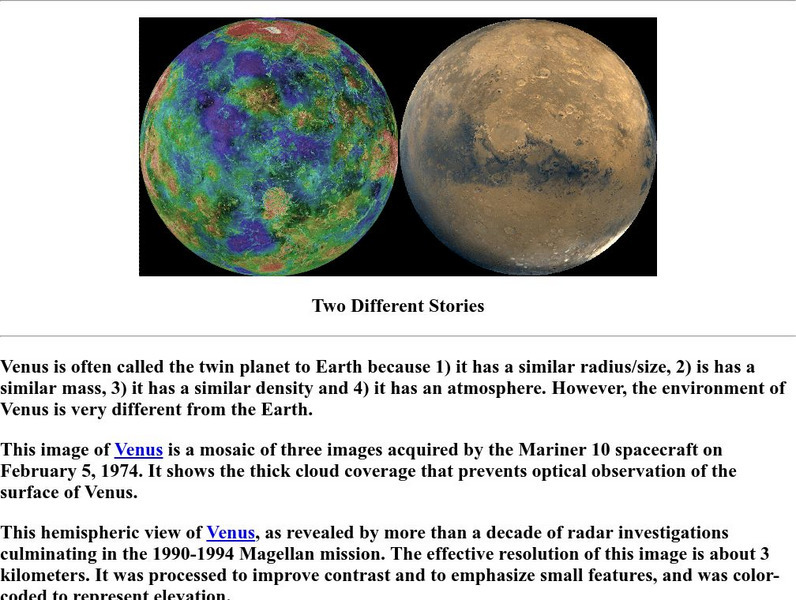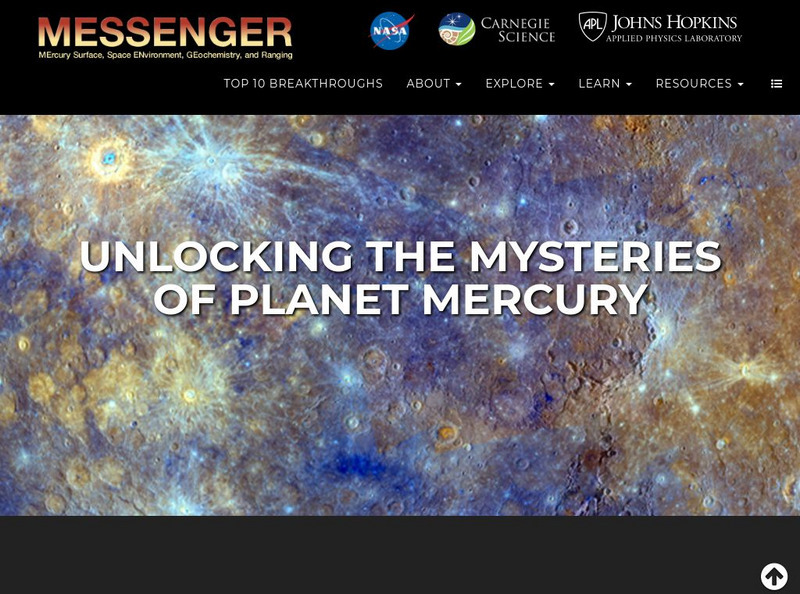NASA
Nasa: Planets in a Bottle
In this simple lesson, students grow yeast to learn how the climates on each of the nine planets would affect life.
Nine Planets
The Nine Planets: An Overview of the Solar System
A detailed overview of the history, mythology, and current scientific knowledge of each of the planets and moons in the solar system.
Science4Fun
Science4 Fun: Venus
Learn fun facts and details about the atmosphere, geography, composition, and discovery of Venus, the second closest planet to the sun.
Kidport
Kidport: Space Science
This complete resource will help students to improve their understand of space exploration. Includes images of the universe, galaxies, stars and planets.
California Institute of Technology
Spitzer Science Center: Historias Desde Espacio: Premiacion a Las Planetas
All the planets are competing to see who is the best planet in the Solar System. Read the story in Spanish to learn the results of the pageant. Excellent source of information presented in a fun manner.
Wonderville Media
Wonderville: Planets
There are eight planets in orbit around our Sun. These planets form our solar system. The eight planets are Mercury, Venus, Earth, Mars, Jupiter, Saturn, Uranus, and Neptune. There are also rocks, moons, comets, and other objects going...
Smithsonian Institution
National Air and Space Museum: Exploring the Planets: Ancient Times & the Greeks
In ancient times only five planets were known: Mercury, Venus, Mars, Jupiter, and Saturn. Learn about Greek astronomer Ptolemy's theory for the solar system that was to survive for fourteen centuries.
NASA
Nasa: Welcome to the Planets Magellan
An overview of the Magellan Mission from the assembly of the spacecraft to its radar mapping of Venus. Includes photographs and descriptions of the different phases of the mission. Streaming audio of the descriptions are also available.
Enchanted Learning
Enchanted Learning: Zoom Astronomy: All About Space
A fantastic collection of information about the solar system. Includes information on all of the planets, the moon, the sun, asteroids, comets, meteoroids, and stars. Also find puzzles, a dictionary, quizzes, classroom activities, and...
NASA
Nasa: La Historia De Hoy: Today's History (Spanish)
Explore the depths of space and science comprehensive information about the meteor showers in 2004, the transit of Venus, virtual reality, and other interesting science history.
University of Oregon
University of Oregon: Atmosphere of Venus
A general information table comparing the atmospheres of Venus and Earth. Good evaluations of the cause of the differences between the two planets.
TeachEngineering
Teach Engineering: Mercury and Venus
Students explore Mercury and Venus, the first and second planets nearest the Sun. They learn about the planets' characteristics, including their differences from Earth. Students also learn how engineers are involved in the study of...
NASA
Nasa: Magellan Mission to Venus
This home page from NASA offers Venus images taken by Magellan and other highlights from the mission. In orbit around Venus for four years this mission provided maps of 98 percent of the surface of Venus that are more detailed than most...
Nine Planets
The Eight Planets: Just for Kids
Here is a clear, simple picture of the solar system. Click on the names of the planets to learn more about each. Clicking on underlined terms takes you to more and more detailed scientific information.
Other
University of Leicester: The Solar System
Resource explores the solar system, with an in depth discussion of each of the planets and their properties.
NASA
Nasa: Solar System Exploration
Enter our solar system to interact with the planets, moons, asteroids, meteors, and more. Investigate with NASA scientists and explore missions related to space exploration. Read facts, compare statistics, look through resources, and...
NASA
Nasa: Solar System Exploration
This stunning site on the solar system gives a great overview of the planets and our sun. Learn about each object's size, vital statistics, and moons. Then go on for a more in depth look at these objects in the column on the left.
Harvard University
Harvard University: The Solar System
These hands-on activities are a great way for students to gain perspective on the relative sizes and distances of each planet, the relationship between the sun and Earth, and much more.
Johns Hopkins University
Applied Physics Laboratory: Messenger Home
Home page for NASA's Discovery Program Messenger to the planet Mercury. Site provides details of the planned mission, its experiments and the science and management teams. Linked Quicktime animation files are very large and detailed....
Curated OER
Web Gallery of Art: Planet Venus
An image of "Planet Venus", created by Master of the Housebook, c. 1475 (Pen drawing, 235 x 143 mm).
NASA
Nasa: Welcome to the Planets Mariner 10
This web page contains images and information on the Mariner 10 space mission. The information is available in audio format.
A&E Television
History.com: The Space Race: Interactive Universe
A virtual journey through space offers photos and facts about Earth and its neighboring planets, comets, other celestial bodies of the Solar System, and the Milky Way and Andromeda galaxies.
Georgia Department of Education
Ga Virtual Learning: Our Solar System
This interactive tutorial will take students on a tour of our solar system. Students begin near the Sun with the really hot planets of Mercury and Venus. They will learn about Mars, probably the first planet that humans will visit. Next...
NASA
Nasa: Image Science Center: Ask the Space Scientist
A NASA scientist, Dr. Sten Odenwald, answers many students' questions. Topics include planets, galaxies, black holes, the origin of the universe, and common misconceptions about space.
Other popular searches
- Venus Planet
- About Planet Venus
- Venus Planet Pictures
- Planet Venus Scale
- Planet Venus Satellites
- Planet Venus Scale Model
- Space Planet Venus
- The Planet Venus
- Planet Venus Games



